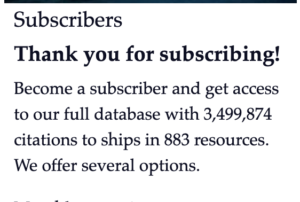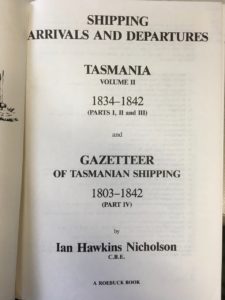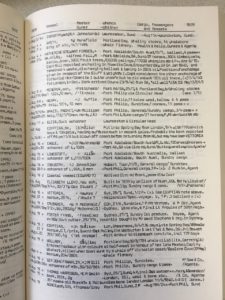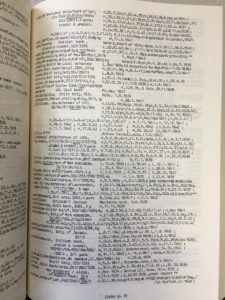I updated the Merchant Vessels of the United States file again this week. This is a file provided by the US Coast Guard describing some 387,000 vessels registered in the United States which have a valid Certificate of Documentation, from the National Vessel Documentation Center, based in Falling Waters, WV. The file lists all boats that receive federal documentation – usually those that will travel between states or outside of the United States, or are about 20+ feet or longer. This is different from state titling, which usually happens for smaller boats with a motor. Of course, the smaller non-powered ones, like rowboats and canoes, usually don’t require any titling or documentation at all.
Anyway, MVUS includes all US-flagged commercial vessels, and a lot of large personal vessels, as well. It’s the best file for finding the most popular vessel names in the US, which is of course a popular topic at a guide to vessel names!
Most commercial vessels have unique names that are just a combination of letters and numbers, like “Art 360”, “Art 361”, “Art 362”, “Art 363”, or “T13909”, “T13911”, “T13912”, etc. Most of these are barges, and to be honest, they’re not that interesting. Of the 209,037 unique ship names (ending with “Zzzz!”) and 386,377 unique vessels in MVUS, 175,049 appear only once. Some of those are quite interesting, and we will investigate a few in the future. For now, here’s how the instance of ship names breaks out:
| # of instances | # of names | # of vessels | % of vessels |
| 1 | 175,051 | 175,051 | 45.3% |
| 2 | 15,626 | 31,252 | 8.1% |
| 3 | 5,724 | 17,172 | 4.4% |
| 4-10 | 8,951 | 51,470 | 13.3% |
| 11-99 | 3,536 | 87,766 | 22.7% |
| 100+ | 149 | 23,800 | 6.1% |
Over 31,000 ships have a single matching partner with the same name somewhere in the country, and nearly 150 have at least 100 different ships with the same name.
Note: this analysis is pretty basic; I didn’t combine vessel names that are very similar, but not the same, like “Ain’t Mis Behavin”, “Ain’t Misbehavin”, “Ain’t Misbehavin’”, and “Ain’t Miss Behavin” – I’m not sure which name I’d combine these under, for instance! Actually, I did correct one or two. There was one listed as “0hana” and I felt pretty sure they meant “Ohana”, and it was a mistake in the Coast Guard’s National Vessel Documentation Center. I could be wrong, though. (I did note the former name in my correction, so if I was wrong, a person can still find that ship name.)
Some people name their vessel “USS Enterprise” or “USS Git-It-Done” or “HMS Michele”. I kept those initial parts in here because, unlike with the actual naval ships, it is a part of the name, for better or (most definitely) for worse. One feature of ShipIndex.org is that when you do search for, say, “HMS Indefatigable” (definitely one of the best ship names ever), the database assumes that you want to search for “Indefatigable”, as that will return the best results. It still gives you the option of searching with the “HMS”, however – which will be useful for those searching for “USS Michele”.
A lot of owners put “The” at the start of their ship name. There are a dozen ships named “The 19th Hole”, along with 27 named “19th Hole”. Ugh. On the one hand, I very much dislike putting “The” at the front of a ship name! On the other hand, my brother and a friend built a rowboat for our dad, and I carved a nameboard for it, and that boat had the name “The Prelude”, with the article. (See a picture of it, below.) But, see, our dad had written a book about William Wordsworth and his poems, one of which was named “The Prelude”, and we also thought this might be a precursor to a larger boat.

Anyway, which are the most popular vessel names in the US, in 2025? Here’s a list of the top 50 vessel names in MVUS, with the number of boats with that name, as of February 2025:
| Ship Name | Number of instances |
| Serenity | 538 |
| Freedom | 519 |
| Andiamo | 390 |
| Liberty | 370 |
| Osprey | 329 |
| Second Wind | 305 |
| Pura Vida | 274 |
| Grace | 271 |
| Ohana | 264 |
| Island Time | 262 |
| Why Knot | 253 |
| Happy Ours | 250 |
| Relentless | 250 |
| Serendipity | 241 |
| Seas the Day | 240 |
| Escape | 239 |
| Legacy | 236 |
| Island Girl | 232 |
| Odyssey | 231 |
| Destiny | 227 |
| Blue Moon | 222 |
| Knot on Call | 222 |
| Carpe Diem | 221 |
| Orion | 221 |
| Calypso | 219 |
| Aurora | 213 |
| Spirit | 209 |
| Endless Summer | 205 |
| Patriot | 205 |
| Gratitude | 201 |
| Voyager | 195 |
| Phoenix | 194 |
| At Last | 191 |
| Tranquility | 188 |
| Morning Star | 187 |
| Dream Catcher | 183 |
| Pegasus | 182 |
| Halcyon | 180 |
| Valhalla | 178 |
| Southern Cross | 177 |
| Bella Vita | 176 |
| Liquid Asset | 176 |
| Zephyr | 176 |
| Harmony | 174 |
| Escapade | 172 |
| About Time | 171 |
| Encore | 171 |
| Journey | 170 |
| Cool Change | 169 |
| Dragonfly | 168 |
In a week or two I’ll write a post that looks at the changes in the most popular vessel names, over the past five years. I hope you found this as interesting as I did!





